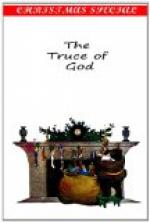When the Pope had finished reading the invectives of Henry and those who were weak enough to second his ambition, so great was the exasperation of the synod, that he adjourned it to meet the next day. When the morrow came, in the presence of one hundred and ten bishops, he recited his former indulgence to Henry, his paternal remonstrances, and his repeated proofs of love and goodness. The whole assembly rose in a body, and implored him to anathematize a perjured prince, an oppressor, and a tyrant, declaring that they would never abandon the Pope, and that they were ready to die in his defence. It was then that Gregory VII rose and pronounced, amid the unanimous acclamations of the synod, the sentence of excommunication against the emperor.
Thus went forth this awful thunderbolt for the first time against a crowned head. A dissolute and ambitious monarch had called upon the successor of St. Peter to yield up the keys, and lay the tiara at the feet of the lion of Austria, because that successor had declared an invincible determination to preserve the purity of the Church and its liberties, at the sacrifice of life itself. The tyrant struck in anger, and the Pontiff, incapable of yielding, gave the blow at last; for the temple of religion was insulted and invaded.
It is easy, when calmly seated at a winter’s fireside, to charge Gregory VII with an undue assumption of temporal power. But he who will study the critical position of Europe during the eleventh century, must bow down in reverence before the mighty mind of him who seized the moment to proclaim amid the storm the independence of the Christian Church. Was not this resistance to Henry expedient? Yes! And to one who knows that the Church was the lever by which the world was raised from barbarism to civilization, and will confess, with Guizot, that without a visible head, Christianity would have perished in the shock that convulsed Europe to its centre, the truth is revealed, as it was to the master mind of Gregory, that had he pursued any other course, peace and unity, as far as human eye extends, would have perished with the compromised liberty of the Church of Rome. Let us rejoice, then, that this sainted Pontiff hurled against the Austrian tyrant the anathema on which was written—“The independence of the Church of God shall be sustained, though the thrones of princes crumble around her, or though her ministers are driven to seal their fidelity with death.”
CHAPTER V
Fierce he broke forth: “And
darest thou then
To beard the lion in his den?
The Douglas in his hall?
And hopest thou hence unscathed to got
No, by Saint Bride of Bothwell, no!
Up drawbridge, grooms!—ho!
warder, ho!
Let the portcullis fall!”
MARMION
For three weeks the Lady Margaret had expected the duke and her brother; for three weeks Gilbert had impatiently awaited his father’s return.




